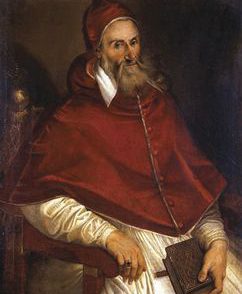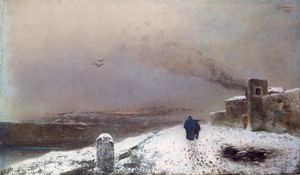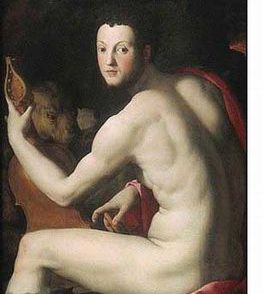Piera da Menabbio, testifies under oath concerning her employment as a servant for a Jewish banker in Pescia
Fourth Day of August [1570] Piera daughter of Giuliano di Andrea da Menabbio presented herself freely in person. She was asked under oath if she had worked in the house of any Jews listed as residents in Pescia. She replied, ‘I have worked only in the house of these Jews’. When asked what services she performed in the house she replied, ‘I did their laundry and when I brought back their clean clothes they would have me do some housework, like cleaning the tinware and copperware and washing the dishes, scrubbing down the tables, sweeping and tidying. For such services they would give me a bit of flour or bread or oil. Once they gave me eight copper coins for carrying a lot of water to their house’. When asked if there had been any Christian maids or menservants or wet-nurses in the house, she replied, ‘I don’t know if there was anyone other than a sister of mine who now lives in Collodi. She stayed in the house on Fridays and Saturdays to lay the fire because they won’t touch fire’. The witness was then given a formal warning regarding the truthfulness of her statement.
The granducal archive reveals the extent to which the ruling Medici family affected the day-to-day life of people at every level of society throughout Tuscany. This glimpse of daily life in Pescia, a small town in northwestern Tuscany, between Lucca and Pistoia, was part of a fact-finding operation to establish the precise state of Jewish settlement in the Florentine dominion of Grand Duke Cosimo and his son Crown Prince Francesco prior to the establishment of the first Jewish Ghetto in Florence in 1571. An official census of all Jews was carried out and legal depositions were taken from Christians who had first-hand knowledge of these ‘strangers next door’.
Piera was working for ‘Emmanuel di Davit Sforno Hebrew of Bologna’ an agent in Pescia for the important da Pisa Jewish banking family. The humble tasks Piera lists were typical for lower servants working in any middle-class household. However, she refers to the fact that her sister stayed overnight in the house on Friday and Saturday to make fires for the household. This would suggest that Emmanuel and his family were observant Jews who would have been unable to carry out such duties for themselves during the Sabbath.
It is interesting that Piera was reluctant to name five other Christian women and two men who admitted to working for Emmanuel. These seven Christians also insisted that their responsibilities were limited to casual outside tasks, such as doing the laundry, carrying water and running errands. All of the servants, including Piera, claimed to have been casual employees carrying out humble tasks with limited ‘inside’ knowledge concerning the activities of a Jewish home.
This reluctance to admit direct involvement in Jewish domestic affairs is understandable given the superstition and suspicion that was aroused by these ‘strangers’ who could be held ‘responsible’ for a tragedy such as the miscarriage suffered by a laundress who happened to work for a Jewish family.
The formal warning concerning the need for truthfulness hangs ominously at the end of the young woman’s testimony. Piera seems to have been conscious of the double danger as she walked the narrow path between revealing too much and concealing the involvement of fellow Christian servants.
Additional information regarding Jews, from the Medici Archives
Cosimo had chosen to ignore the Papal Bull of 1555, which demanded that the treatment of the Jews reflect ‘the eternal state of servitude imposed by God on the Jews’. In fact, Cosimo had granted Tuscan Jewish special privileges in defiance of papal influence in the running of his state.
However, when Cosimo was granted by the Pope the title of Grand Duke he launched a campaign against Jewish money lenders. The census of the Jews and the seeking of Christian testimony on the habits and customs of the ‘Hebrews’ laid the foundations for his new policy. He was seeking legal reasons rather than religious to ostracize them. Once accused of breaking financial rules and legal contracts, the Jew had a simple choice:leave Tuscany or move into the newly created Jewish Ghetto.
Cosimo had already purchased the land and buildings of a run-down area of Florence (it is now the Piazza della Republica), and it was here that the Ghetto would be established, with all Jews paying rent to the landlordwho was of course Grand Duke Cosimo I, the politician with a merchant’s mentality.
This extract was translated and researched by Ippolita Morgese, president of the Medici Archive Project, the comment was written by Mike Samuda.







